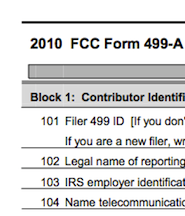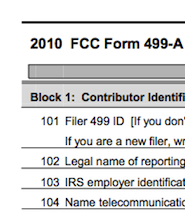 I raise my cup of espresso to the FCC for starting the process to reform the Universal Service Fund with the ultimate goal of modernizing a rusting regulatory structure that is not up to task of universal broadband service.
I raise my cup of espresso to the FCC for starting the process to reform the Universal Service Fund with the ultimate goal of modernizing a rusting regulatory structure that is not up to task of universal broadband service.
Reading the beginning of the FCC’s recent Proposed Rule Making on the USF, I was all to ready to discount the glib appraisals of the Service Fund as “inefficient” and “broken”. Sure it’s not perfect, I thought, and of course there are loopy incentives encouraging some inefficient activities, but…
A dispute between XO Communications, “one of the nation’s largest communications service providers”, and the Fund’s administrator, the Universal Service Administration Corporation or USAC, unfortunately seems to validate some of the harsh criticisms hurled at the current USF regime.
It has all the makings of an on-the-edge-of-your-seat FCC caper: battling attorneys, hyper-diligent auditors, endless bureaucratic procedures, ambiguous forms, battling attorneys, and battling attorneys.Continue reading



 I raise my cup of espresso to the FCC for starting the process to reform the Universal Service Fund with the ultimate goal of modernizing a rusting regulatory structure that is not up to task of universal broadband service.
I raise my cup of espresso to the FCC for starting the process to reform the Universal Service Fund with the ultimate goal of modernizing a rusting regulatory structure that is not up to task of universal broadband service.
